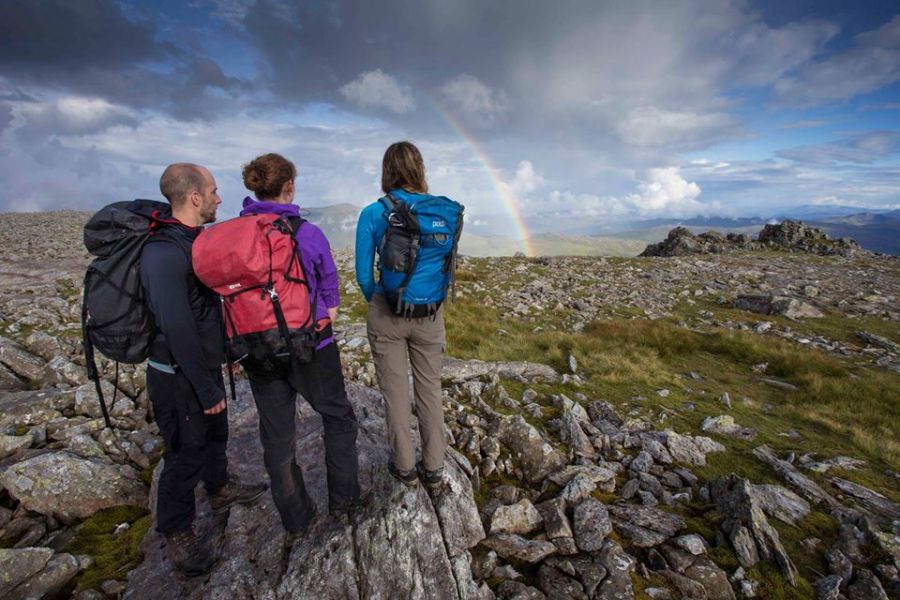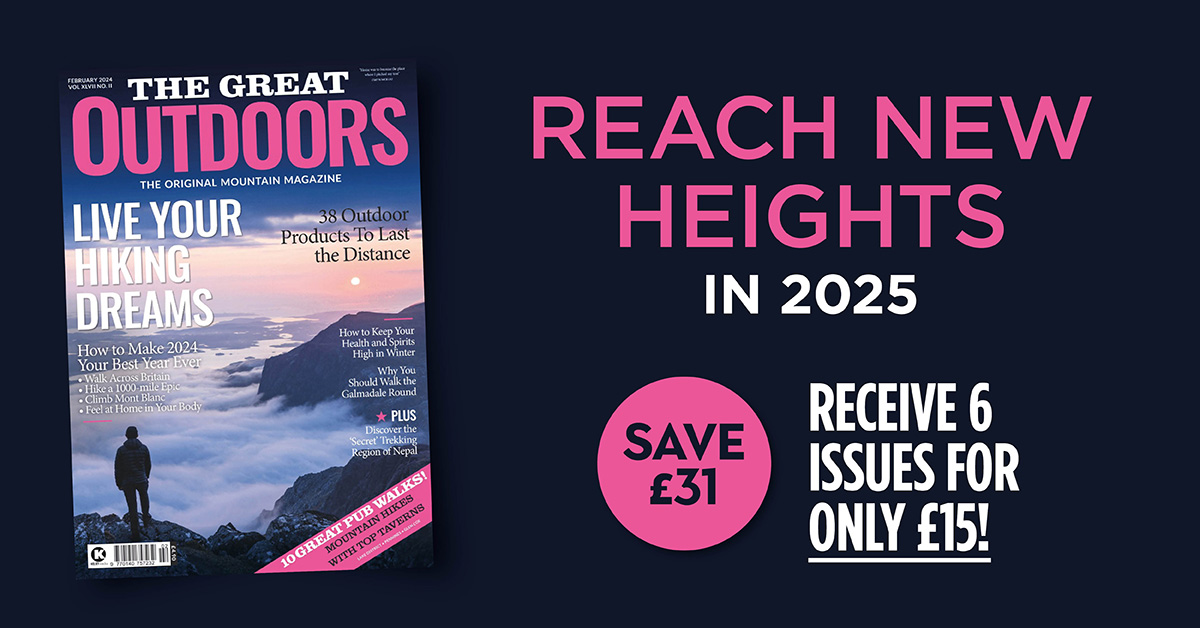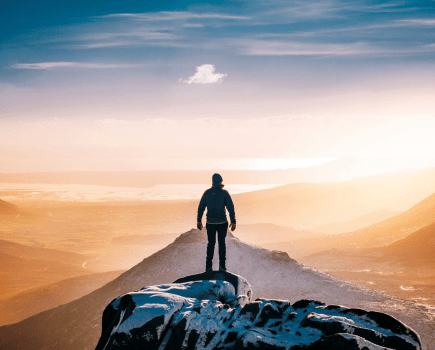As the speed and ferocity of the coronavirus outbreak accelerates, here’s what every hillwalker and outdoor enthusiast needs to know about the pandemic. We’ll be updating this page regularly to reflect the latest advice and restrictions.
After the government announced an enforced lockdown on 24/03/2020, forbidding non-essential travel and reducing exercise to once a day, we have stopped updating this page until the restrictions are either lifted or tighten further. Keep an eye on our website for tips, advice and inspiration to help get through this challenging time.
24/03/2020: Latest updates
The government has announced an enforced lockdown. People can only leave their homes for the following reasons:
- Shopping for necessities, as infrequently as possible;
- One form of exercise a day, such as running or cycling, alone or with household members;
- For medical or care needs, for example to help a vulnerable person;
- Travelling to and from work, but only if you cannot work from home.
Needless to say, this rules out travelling to the hills and mountains.
Mountain rescue organisations, national parks and governing bodies had all previously issued appeals to stop hillwalking and climbing to reduce transmission risk and avoid the possible use of precious emergency service resources.
The lockdown is for the best, but there’s no doubt this is a daunting time for many outdoor enthusiasts. We will keep providing tips, advice and inspiration to help us all get through it – and remember, the hills will be there to welcome us back when all this passes.
23/03/2020: Latest updates
The British Mountaineering Council (BMC) has issued a statement asking all climbers and hill walkers to stay in their local area and put climbing and walking on hold.
Dave Turnbull, BMC CEO, said: “We never thought we’d be telling our members not to go climbing or hill walking, but that’s our current advice. It’s time to put it on hold.”
Elfyn Jones, BMC access officer and member of Llanberis Mountain Rescue said: “There’s been a lot of talk about justifying why we can still climb or hill-walk safely within our capabilities and that, somehow, we can do this without affecting anyone else or impacting spread of the virus. The simple fact is – we can’t. Please stop.
“Stay in your home area. We all owe it to everyone else to do everything we can to help stop or at least delay the spread of this disaster. Please put climbing, mountaineering and hill walking on hold until it’s safe to do so.”
——–
The Ramblers has issued new guidelines for walkers.The advice includes:
- Only walk locally to where you live. This means only walking in places that you can access without the use of a car or public transport. Avoid busy places including popular parks, beauty spots or beaches.
- Ideally walk on your own or with people from your household, unless you are in a household with COVID-19 symptoms when you should self-isolate at home. Those aged 70 or older and those with pre-existing health conditions that put them at increased risk of contracting COVID-19 should also self-isolate at home.
- Keep two metres distance from anyone you meet during your walk.
- Do not walk anywhere that you could get in to trouble and require the emergency services.
- Avoid touching gates, fences etc. If you do, clean your hands with anti-bac and wash your hands as soon as possible. Upon returning home, wash your hands.
——–
After the UK’s national parks saw huge numbers of visitors over the weekend, they have emphasised that connecting with nature should be done close to home. Some national parks, such as the Peak District, have asked visitors to stay away unless their visit is “absolutely necessary”.
Snowdonia National Park warned that trails and car parks could be closed after “unprecedented” crowds flocked to Snowdon and its surrounds over the weekend. Welsh ministers are allegedly considering their legal powers to force people to stay away during the coronavirus outbreak.
Check out the websites of individual national parks for the latest advice.
——–
The Mountain Bothies Association (MBA) has announced the closure of all MBA-maintained bothies.
The organisation said: “In line with Government and medical advice about social distancing, all MBA maintained bothies are closed to visitors until further notice. The Association has also cancelled all meetings and work parties.”
——–
A group of 35 national outdoor activity, tourism, nature, health and rescue organisations, has come together to back the Prime Minister’s call for the public to behave responsibly while exercising outside.
The group called for the following:
- Enjoy active outdoor recreation in your local area, while practising good social distancing at all times.
- Do not travel to popular tourist areas and reduce the risk of groups gathering in one place.
- Stay close to home – consider low risk, familiar activities in local areas, such as a local walk or run.
- Avoid public transport and social gatherings – keep active by travelling on foot or bike.
- Outdoor play and learning opportunities that reflect government guidelines are available to children, including those of key workers attending school.
——–
22/03/2020
In his daily press conference, the Prime Minister warned that he would close open spaces and limit all movement outside homes if people continued to ignore social distancing recommendations.
“If people can’t make use of parks and playgrounds responsibly, in a way that observes the 2 metre rule, then of course we’e going to have to look at further measures. We will think about this very actively in the next 24 hours,” he said.
Mountain Rescue England and Wales has called upon the public to observe the following pointers:
- A lot of MR volunteers have day jobs that will be important in the coming weeks and months — paramedics, NHS staff etc — so we need to enable them to stay well and focus on that work. And we need the public’s help to make this possible.
- Please avoid all but essential travel and do not to take any unnecessary risks. If you are going to go out, you should walk, climb or cycle well within your capabilities so that you can keep yourself safe and not need us.
- If you need MR assistance but suspect you may have Covid-19 or have been in contact with someone who has it then please, tell the police this information as soon as you can when calling 999 for help.
——–
Cumbria Police has asked visitors to stay away from the Lake District to “save lives” during the coronavirus outbreak.
——–
The Scottish Cabinet Secretary for transport has announced that ferry companies will stop taking non-essential travellers between the mainland and the Scottish islands. Visitors already on the islands will be able to leave. Highlands MSP Kate Forbes has criticised people who “use the Highlands as your means of self-isolation”.
Q&A
Do current restrictions rule out hiking and hillwalking?
You can still continue to walk in your local area – but as much as it hurts, the hills and mountains should be considered off-limits right now.
Travelling to the hills increases the risk of virus transmission and potential pressure on the vital resources of the emergency services through accidents. Government guidance rules out ‘non essential’ travel, and hillwalking can’t be considered essential. National parks, mountain rescue organisations, governing bodies, and local authorities have also appealed for people to stay away.
The British Mountaineering Council (BMC) has issued a statement asking all climbers and hill walkers to both stay in their local area and put climbing and walking on hold. Elfyn Jones, BMC access officer and member of Llanberis Mountain Rescue said: “There’s been a lot of talk about justifying why we can still climb or hill-walk safely within our capabilities and that, somehow, we can do this without affecting anyone else or impacting spread of the virus. The simple fact is – we can’t. Please stop.”
This advice is echoed by mountain rescue teams. Mountain Rescue Scotland has appealed to outdoor enthusiasts not to visit Scotland’s hills and mountains, saying “All travelling to the hills stops now for all of us.”
Several of the UK’s most popular outdoor adventure playgrounds have also urged tourists to stay away, with Snowdonia National Park, the Peak District National Park, Cumbria Police and Highlands MSP Kate Forbes all publicly asking visitors to steer clear.
You can still go outside to walk and run, but the latest Ramblers guidelines call on walkers to confine themselves to what they can access from their doorstep.
The advice includes:
- Only walk locally to where you live. This means only walking in places that you can access without the use of a car or public transport. Avoid busy places including popular parks, beauty spots or beaches.
- Ideally walk on your own or with people from your household, unless you are in a household with COVID-19 symptoms when you should self-isolate at home. Those aged 70 or older and those with pre-existing health conditions that put them at increased risk of contracting COVID-19 should also self-isolate at home.
- Keep two metres distance from anyone you meet during your walk.
- Do not walk anywhere that you could get in to trouble and require the emergency services.
- Avoid touching gates, fences etc. If you do, clean your hands with anti-bac and wash your hands as soon as possible. Upon returning home, wash your hands.
So I should avoid travelling to the hills?
Yes. The government has advised against any non-essential foreign travel and against ‘unnecessary travel’ generally. Visitors have continued to pour into areas such as Snowdonia and the Scottish Highlands, however, leading to anti-tourist messages from locals and pleas to visitors from locals tourist boards and MPs to stay away.
If you’re travelling within the local area then using public transport could up your chances of exposure to the virus. The official government advice is to avoid ‘non-essential’ use of public transport.
Should I avoid higher-risk activities such as scrambling and climbing?
Yes. The above advice applies with even more force to higher-risk activities. Putting yourself in a situation that could require the deployment of mountain rescue teams is highly irresponsible in the current climate – and there is also no guarantee that rescue would come.
Elfyn Jones of the Llanberis Mountain Rescue team says: “There is a real possibility of reduced or even no cover for mountain rescue in some areas as this develops.”
How could the situation change?
The current ‘social distancing’ guidance is not currently accompanied by enforcement in the UK, but this is likely to change. Other European countries have introduced far more stringent lockdown measures. In France, for example, people are only allowed to leave their houses to exercise if they do so individually and in the vicinity of their homes. Penny Walker of The Adventure Creators, who is based in the foothills of the French Pyrenees, says: “Regarding restrictions on exercise in France, there is zero flexibility. Only a stretch of the legs around your home is permitted. So no hiking for the foreseeable future.”
In Lombardy, the epicentre of the outbreak in Italy, people are currently forbidden from even leaving their homes for exercise.
Will all footpaths remain open?
It’s likely that some permissive paths will close. The National Trust, for instance, has announced the closure of the path between Hare Hill and Alderley Edge as part of its wider closure of the Hare Hill estate.
Do I need to cancel any UK trips? And how far ahead?
Given the above advice, if you have a UK holiday, walking break or outdoor trip involving accommodation booked for the near feature, the only responsible thing to do is to call it off. There is a high likelihood that future travel restrictions will prohibit it anyway.
The question of how long the pandemic will last, and how tight the restrictions will become, is currently a moving target, but it is predicted to peak in the UK in the early summer. Many walkers have already ‘voted with their feet’ and opted to cancel holidays over the summer – particularly when they involve long-distance walking between different accommodation.
One of our readers, Sarah Hall, shelved plans to walk a section of the Coast to Coast between St Bees and Grasmere after the government published its ‘social distancing’ recommendations. “As disappointed as we were, we felt it was our responsibility to cancel the trip,” she says. “I feel so bad for the hotels, hostels, pubs and sherpa luggage transfer service that we have had to let down, but we vow to go back as soon as it’s safe.”
But if you do decide to call off a trip, keep in mind the enormous financial strain many accommodation providers will be under. We are asking people who were due to take part in The Great Outdoors Challenge this year (an annual coast-to-coast walk across Scotland with 300 participants, supported by this magazine), which has been cancelled, to think twice before cancelling with the likes of bunkhouses and hostels, if they can afford to. An email to participants from the organisers said: “We fear many may not survive and be able to offer accommodation to Challengers in future years. Please bear this in mind and, if you have the funds available, perhaps consider not requesting a refund and/or provisionally booking for next year’s event.”
What about camping and wild camping?
The same advice applies here as above – a camping or wild camping trip, particularly one involving significant travel, is not compatible with current government guidance and requests from local authorities and national parks to stay away.
What if I’ve got an overseas trip booked?
You’ll almost certainly have to cancel. On 17th March, the Foreign and Commonwealth Office advised British nationals against any non-essential foreign travel. Foreign secretary Dominic Raab said: “UK travellers abroad now face widespread international border restrictions and lockdowns in various countries. The FCO will always consider the safety and the security of British nationals, so with immediate effect today I have taken the decision to advise British nationals against non-essential travel, globally, for an initial period of 30 days and of course subject to ongoing review.”
The advice will have a major impact on anyone planning an overseas expedition. Arctic traveller Ash Routen, who was forced to cancel a 700km trek along the coast of Baffin Island, told us that he’d been planning the trip with a friend for 18 months.
“We’ve both sunk in the equivalent of a small flat deposit in money terms, thousands of emails, many phone calls, and for me, two preparatory trips,” he added. “I can sum up my disappointment like this – beyond friends and loved ones the Baffin trip has almost been my sole focus in life for nearly two years. You become obsessed with planning, and it’s always there in most of your waking thoughts. We all need purpose in life, and for me such trips are the purpose. So to cancel is very hard to stomach. Sure the world has bigger fish to fry, but that doesn’t mean we can’t be disappointed.”
If I have to cancel an overseas trip, will I get my money back?
It depends on your insurance company and how you booked your trip. Some travel agencies have relatively generous cancellation policies, while others will charge you the full cost of accommodation. Many insurers – the BMC included – allow for claims related to the FCO advising against travel to your destination. It’s also worth contacting airlines directly to ask for a full refund.
Are any outdoors events and courses still running?
Most have been cancelled or postponed, including all BMC events for March and April and all group-led Ramblers walks and volunteer-led activities. Plus y Brenin will be closed after March 20th and Glenmore Lodge after March 21st.
Is there anything else you’d like to know? Ask us on Twitter and we’ll do our best to answer your questions here.







